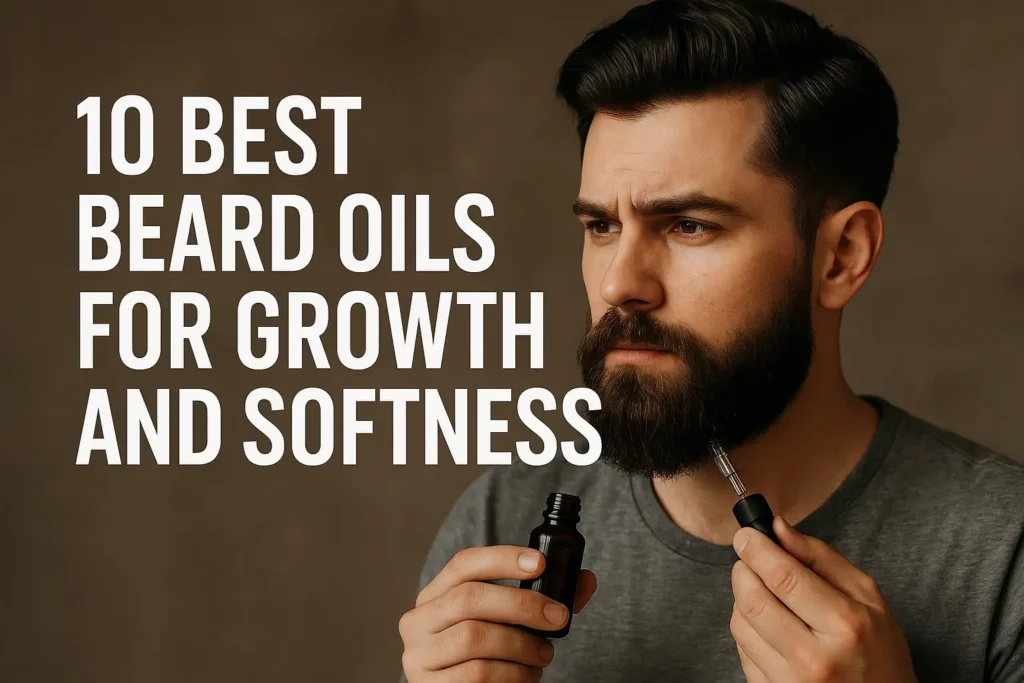Discover the best beard oils for growth and softness in 2025. Expert reviews, benefits, and tips to achieve a fuller, healthier, and softer beard.
Introduction
Beards have become more than just a trend—they are a true expression of style, masculinity, and individuality. Whether you are growing a full Viking-style beard or maintaining a neatly trimmed look, one thing remains essential: proper beard care. Without the right grooming routine, facial hair can easily become dry, itchy, and unruly, making the journey to a thick and healthy beard frustrating. That’s where beard oils come in as a game-changer.
Beard oil is not just a luxury item—it’s a must-have grooming essential for men who want their beards to look fuller, softer, and healthier. These specially formulated blends of natural oils, such as jojoba oil, argan oil, castor oil, and coconut oil, help nourish both your facial hair and the skin underneath. The result? Enhanced beard growth, reduced itchiness, and a smooth, well-conditioned beard that feels as good as it looks.
In this guide, we’ll explore the Best Beard Oils for Growth and Softness to help you choose the right product for your grooming routine. From budget-friendly picks to premium, all-natural formulas, we’ve carefully reviewed the top options trusted by barbers and bearded men worldwide. You’ll also learn how to apply beard oil correctly, avoid common mistakes, and understand what ingredients matter most for healthy beard development.
Whether you’re just starting your beard journey or looking to upgrade your grooming game, this comprehensive review will give you everything you need to keep your beard soft, strong, and irresistibly touchable.
What is Beard Oil and Why is it Essential?
Growing a beard isn’t just about putting down the razor—it requires proper care and nourishment. That’s where beard oil comes into play. Designed specifically for facial hair, beard oil is a lightweight grooming product made from a blend of carrier oils (such as jojoba, argan, or coconut oil) and essential oils (like tea tree, sandalwood, or peppermint). Together, these natural ingredients provide the hydration and nutrients your beard needs to thrive.
Definition of Beard Oil
Beard oil is essentially a leave-in conditioner for your beard and the skin underneath. Unlike regular hair oils or moisturizers, beard oil is formulated to penetrate coarse facial hair and nourish the follicles at the root level. This helps maintain a balance of moisture, prevents dryness, and encourages healthier, fuller growth.
Benefits of Using Beard Oil
The advantages of incorporating beard oil into your daily routine are hard to ignore:
-
Stimulates Beard Growth – Natural oils like castor and argan are rich in vitamins that strengthen hair follicles and promote faster growth.
-
Softens Facial Hair – Beard oil reduces roughness and brittleness, leaving your beard smooth and touchable.
-
Prevents Itchiness & Flakes – By hydrating the skin underneath, it combats dryness, beard dandruff, and irritation.
-
Improves Appearance & Confidence – A well-groomed, shiny beard makes you look more polished and confident.
-
Protects Against Damage – Acts as a barrier against environmental factors like dust, pollution, and UV rays.
In short, beard oil is not just an add-on product—it’s a fundamental part of any effective beard care routine. Whether your goal is beard growth or simply maintaining softness and manageability, a high-quality beard oil makes all the difference.
How to Choose the Best Beard Oil
With so many beard oils on the market, choosing the right one can feel overwhelming. Not all beard oils are created equal—some are packed with natural, nourishing ingredients, while others rely on artificial fragrances and fillers that may do more harm than good. To make the right choice, you need to understand what to look for and how to match the product to your beard type, skin type, and personal preferences.
Ingredients to Look For
The foundation of any high-quality beard oil lies in its ingredients. The best formulas typically include a blend of carrier oils and essential oils:
-
Jojoba Oil – Closely mimics the skin’s natural sebum, making it an excellent moisturizer.
-
Argan Oil – Rich in vitamin E and fatty acids, it strengthens and softens beard hair.
-
Castor Oil – Known for stimulating beard growth by improving blood circulation.
-
Coconut Oil – Provides deep hydration and reduces beard dandruff.
-
Tea Tree Oil – Helps fight bacteria and reduces itchiness or irritation.
Skin Type Consideration
Your skin plays a huge role in determining the right beard oil:
-
Dry Skin – Look for heavier oils like argan or coconut to provide deep hydration.
-
Oily Skin – Go for lighter oils such as jojoba or grapeseed to avoid clogged pores.
-
Sensitive Skin – Choose unscented or organic beard oils to minimize irritation.
Scent vs. Unscented
Fragrance is often a personal choice. Some men prefer scented beard oils with notes of sandalwood, cedarwood, or citrus for a refreshing boost. Others prefer unscented formulas, especially if they have sensitive skin or already use colognes.
Price vs. Quality
A higher price doesn’t always mean better quality, but investing in a reputable brand with natural, cold-pressed oils is worth it. Cheaper options with synthetic fillers may feel greasy and fail to deliver results. Aim for products that balance effectiveness with affordability.
Top 10 Best Beard Oils for Growth and Softness
1. Honest Amish Classic Beard Oil
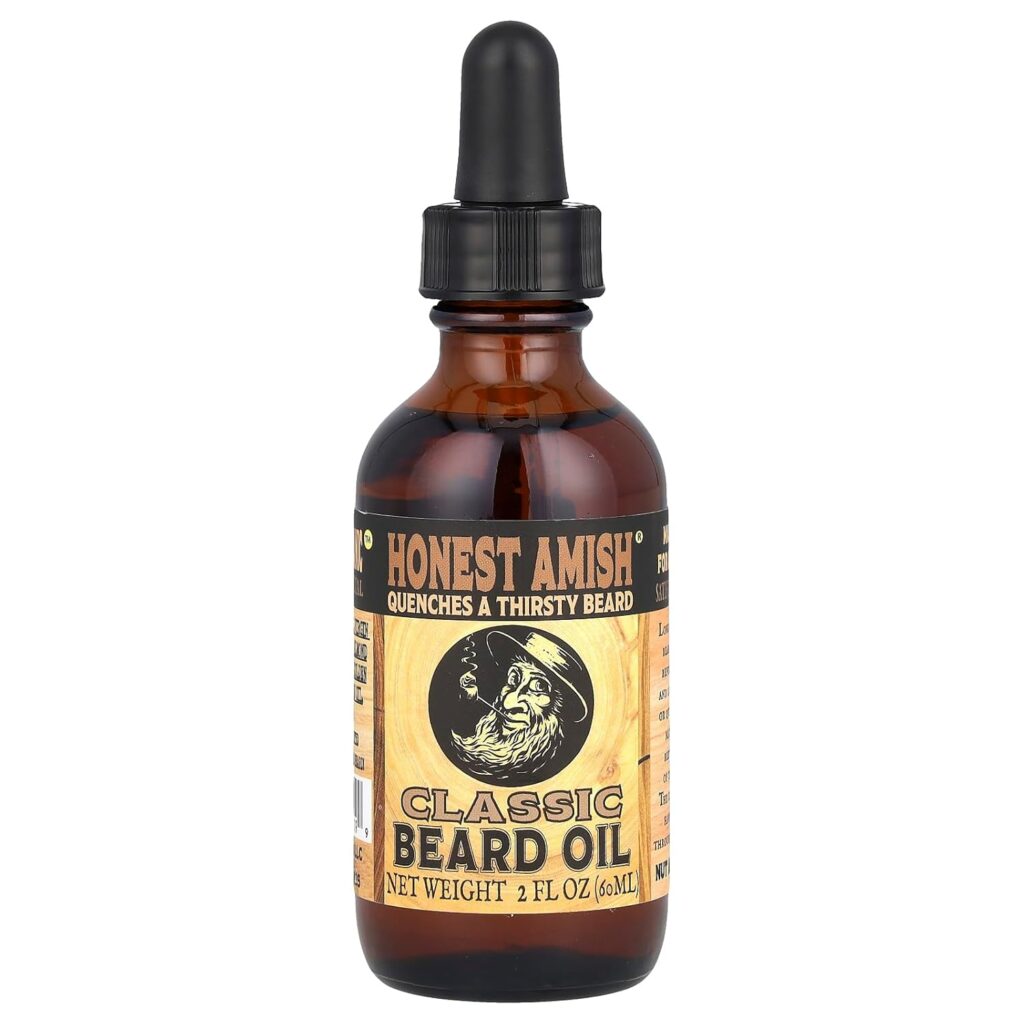
Check Price on Amazon
Overview: One of the most popular and trusted beard oils on the market, made with 100% natural and organic ingredients.
-
Key Ingredients: Avocado oil, virgin pumpkin seed oil, apricot kernel oil, golden jojoba oil, and essential oils.
-
Pros: Organic, lightweight, softens beard quickly, pleasant herbal scent.
-
Cons: Scent may be too subtle for those who prefer stronger fragrances.
-
Best For: Men who want an all-natural, beginner-friendly beard oil.
2. Jack Black Beard Oil
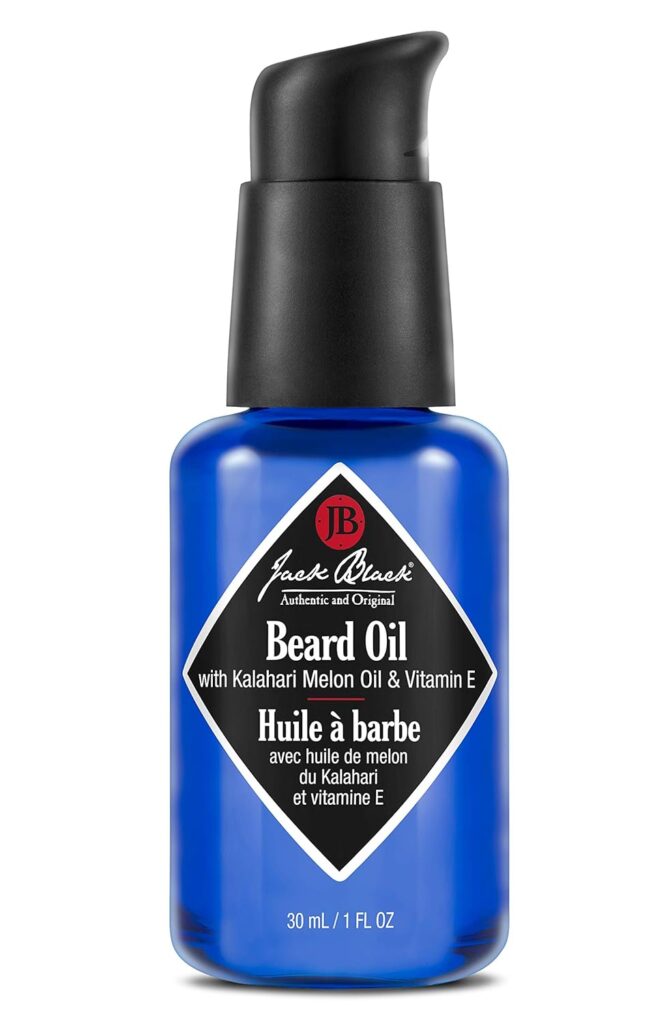
Check Price on Amazon
Overview: A premium beard oil enriched with vitamins and antioxidants.
-
Key Ingredients: Kalahari melon oil, vitamin E, brown algae, carrot extract.
-
Pros: Non-greasy, fast absorption, nourishes both beard and skin.
-
Cons: Higher price point compared to competitors.
-
Best For: Men with dry, brittle beards who want deep hydration.
3. Viking Revolution Beard Oil
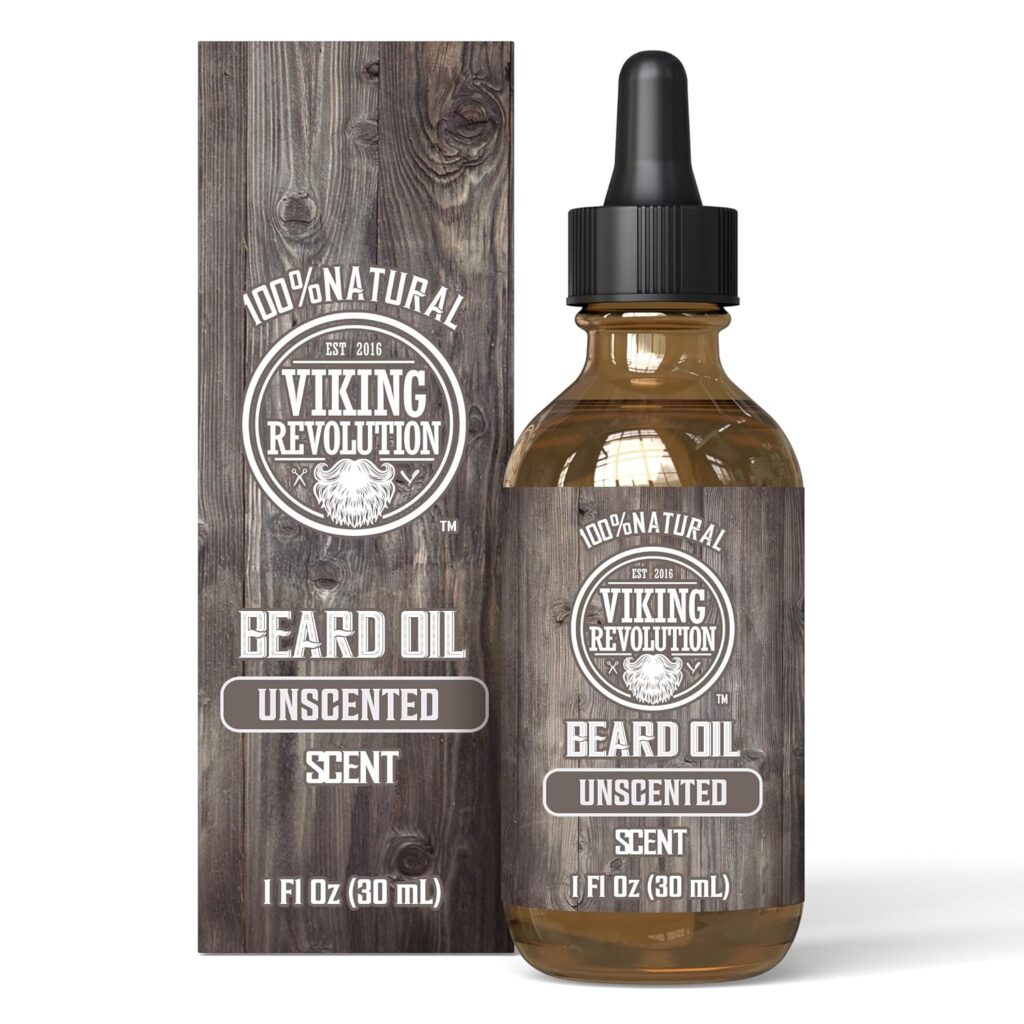
Check Price on Amazon
Overview: A budget-friendly option with natural oils designed for everyday use.
-
Key Ingredients: Argan oil, jojoba oil.
-
Pros: Affordable, fragrance-free, effective at reducing beard itch.
-
Cons: Limited ingredient variety compared to premium brands.
-
Best For: Beginners or men looking for a simple, no-fuss beard oil.
4. Proraso Beard Oil
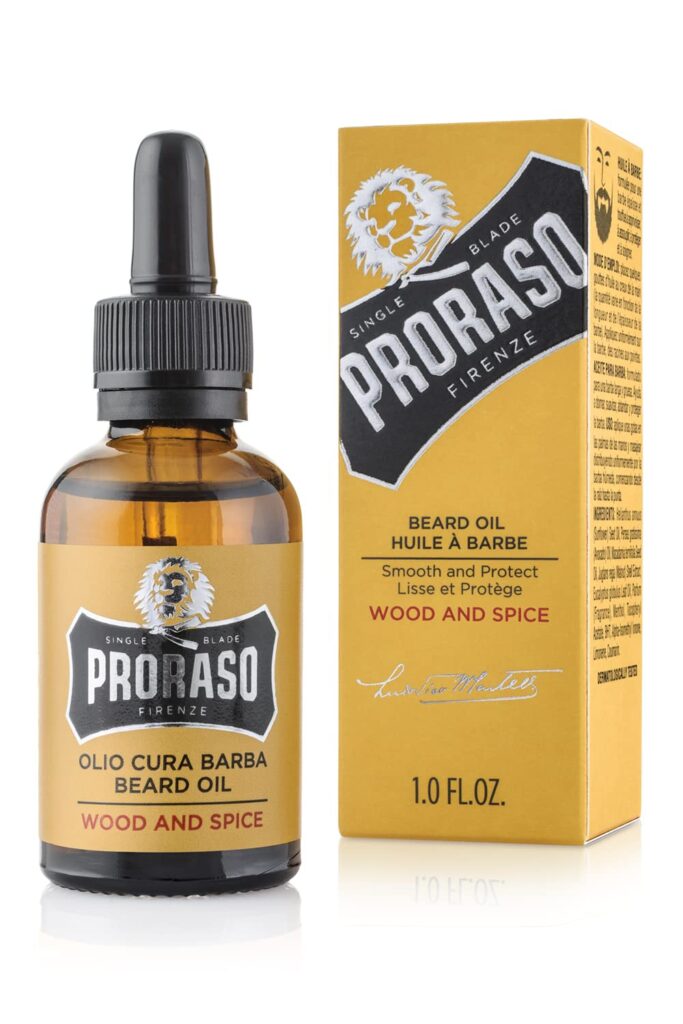
Check Price on Amazon
Overview: Italian-made beard oil with a reputation for quality grooming products.
-
Key Ingredients: Sunflower seed oil, macadamia nut oil, avocado oil, menthol.
-
Pros: Excellent for softening long or coarse beards, refreshing, cooling effect.
-
Cons: Slightly heavy texture, not ideal for oily skin.
-
Best For: Men with thick, coarse, or long beards.
5. Bossman Beard Oil Jelly
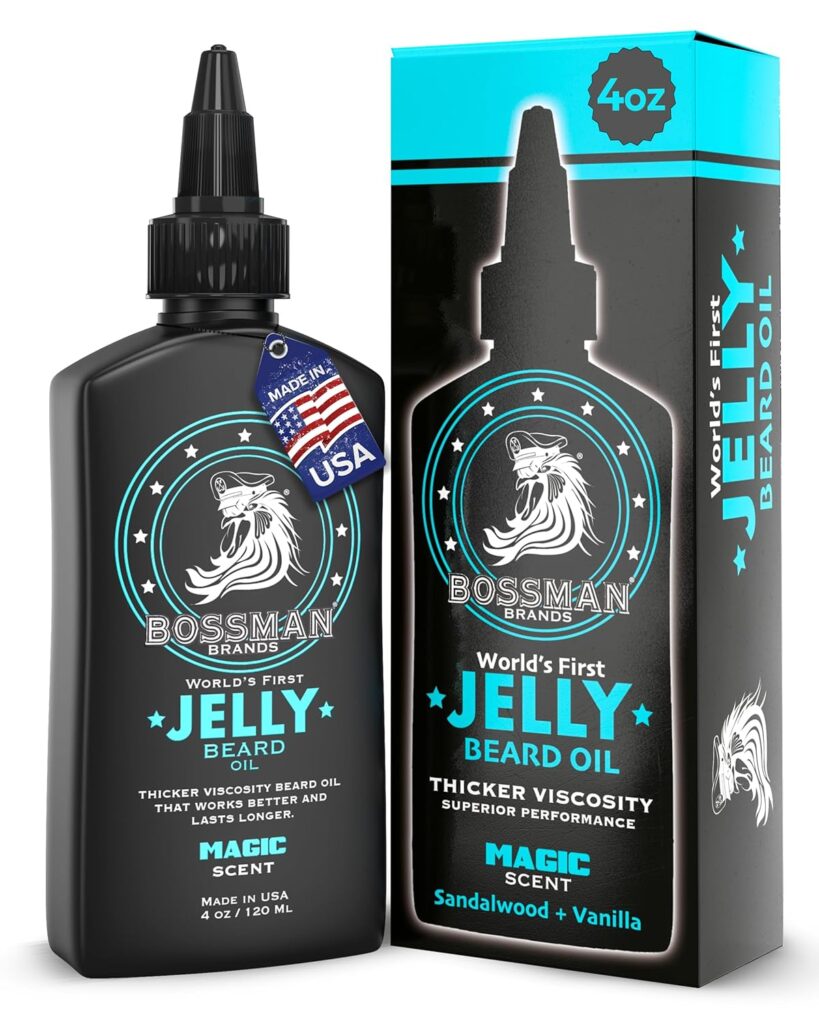
Check Price on Amazon
Overview: Unique jelly-like formula that lasts longer than traditional oils.
-
Key Ingredients: Soybean oil, beeswax, castor seed oil, shea butter.
-
Pros: Long-lasting hydration, thicker texture, protects the beard from dryness.
-
Cons: Can feel heavy if applied in excess.
-
Best For: Men with very dry beards needing extra conditioning.
6. Grave Before Shave Beard Oil

Check Price on Amazon
Overview: A beard oil known for its wide range of masculine scents.
-
Key Ingredients: Tea tree oil, apricot oil, jojoba oil, vitamin E.
-
Pros: Variety of scents, great conditioning effect, reduces dandruff.
-
Cons: Scent might be too strong for sensitive users.
-
Best For: Men who enjoy experimenting with different fragrances.
7. Cremo Beard Oil
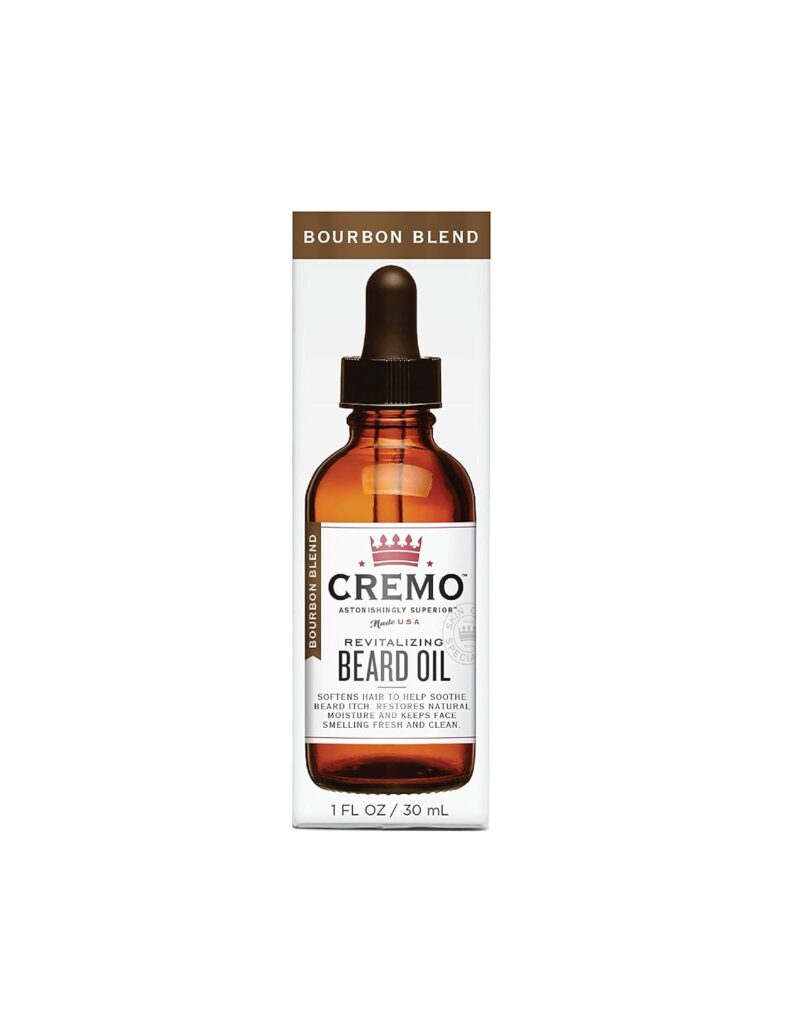
Check Price on Amazon
Overview: Affordable, widely available, and effective for daily beard maintenance.
-
Key Ingredients: Argan oil, jojoba oil, coconut oil.
-
Pros: Non-greasy, softens beard quickly, and budget-friendly.
-
Cons: Smaller bottle size, scent fades fast.
-
Best For: Men seeking an affordable yet effective daily beard oil.
8. Beardbrand Beard Oil
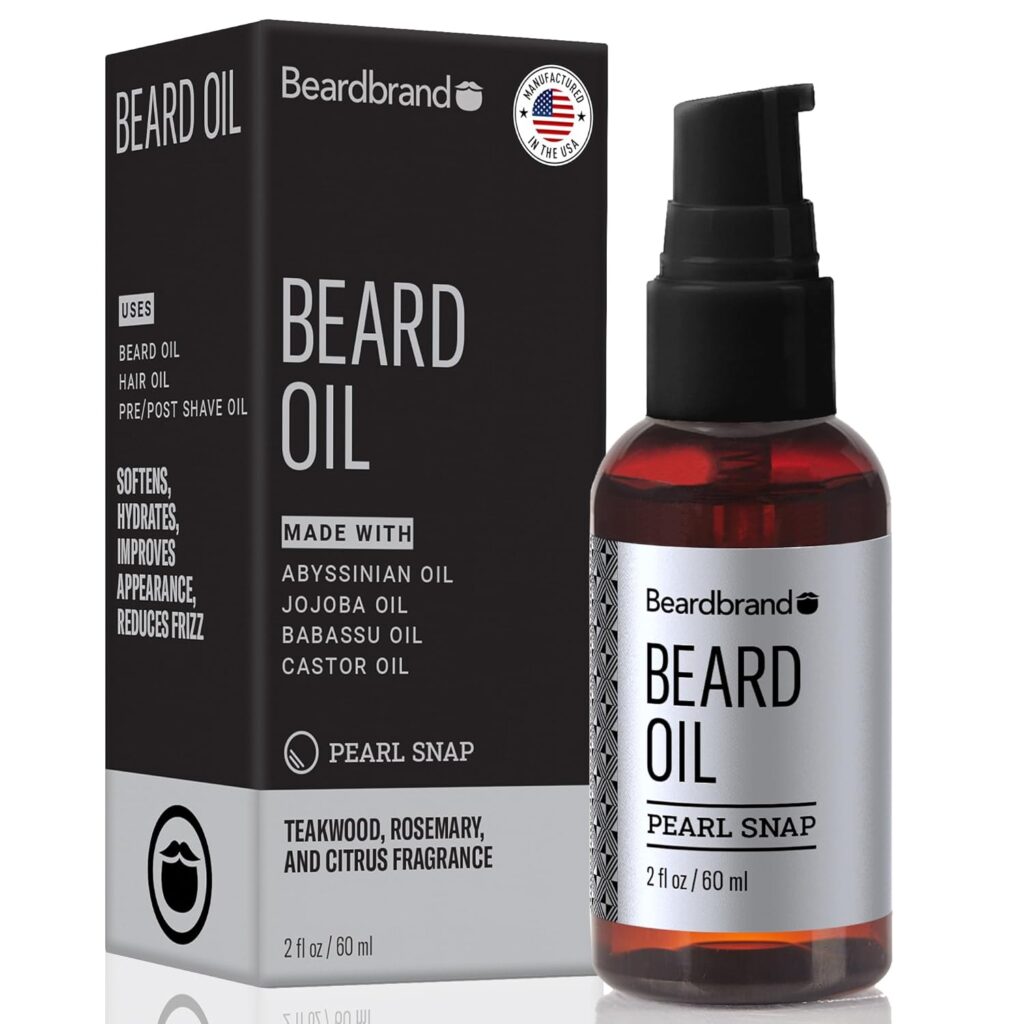
Check Price on Amazon
Overview: A premium grooming brand known for stylish packaging and unique scents.
-
Key Ingredients: Jojoba oil, almond oil, castor oil.
-
Pros: Premium quality, luxury scents, lightweight formula.
-
Cons: More expensive than most competitors.
-
Best For: Men who value premium grooming products and unique fragrances.
9. Leven Rose Beard Oil
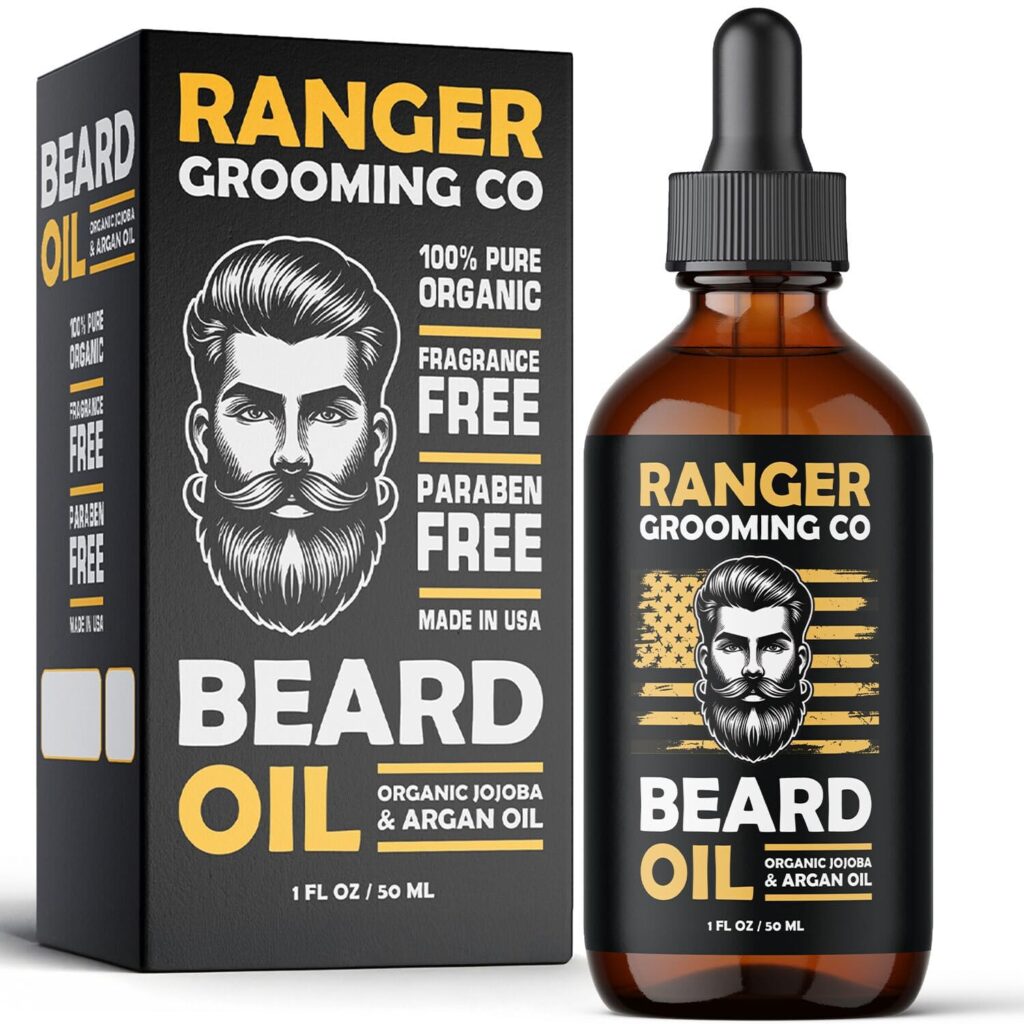
Check Price on Amazon
Overview: 100% organic, fragrance-free beard oil perfect for sensitive skin.
-
Key Ingredients: Jojoba oil, Moroccan argan oil.
-
Pros: Unscented, safe for all skin types, fast-absorbing.
-
Cons: May feel too light for very coarse beards.
-
Best For: Men with sensitive skin or those who prefer unscented products.
10. Mountaineer Brand Beard Oil
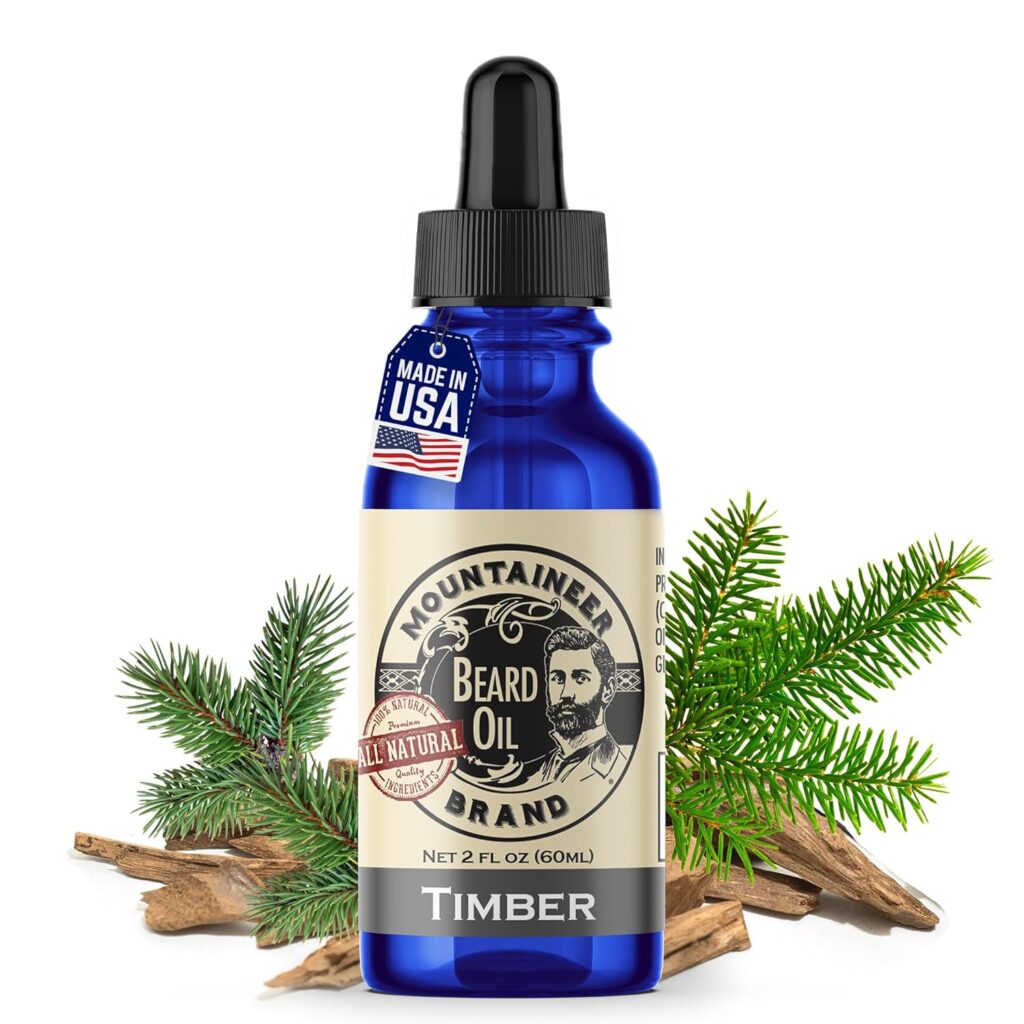
Check Price on Amazon
Overview: Natural beard oil made in the USA with a woodsy, masculine scent.
-
Key Ingredients: Grapeseed oil, almond oil, castor seed oil.
-
Pros: Natural formula, affordable, refreshing scent.
-
Cons: Slightly thinner consistency, requires more frequent application.
-
Best For: Men looking for a natural, budget-friendly option with a classic scent.
How to Use Beard Oil Correctly
Applying beard oil may sound simple, but doing it the right way ensures you get the maximum benefits for beard growth, softness, and skin health. Here’s a step-by-step guide to help you incorporate beard oil into your daily grooming routine.
Step-by-Step Guide
-
Start with a clean beard – Always wash your face and beard with a gentle cleanser or beard shampoo. Applying oil to a dirty beard traps dirt and reduces absorption.
-
Dry your beard – Pat your beard dry with a towel until it’s slightly damp. This allows the oil to lock in moisture.
-
Dispense the right amount – For short beards, use 3–4 drops; medium beards may need 5–7 drops; longer beards can require 8–10 drops.
-
Warm it up – Rub the oil between your palms to distribute it evenly before application.
-
Massage into skin and beard – Work the oil into the skin beneath your beard first, then spread it throughout the hair. This promotes healthy follicles and prevents dryness.
-
Use a comb or brush – Distribute the oil evenly with a beard comb or boar-bristle brush for best results.
Common Mistakes to Avoid
-
Using too much oil – More is not always better. Excess oil can make your beard look greasy and clog pores.
-
Skipping consistency – Beard oil should be used daily (morning and/or night) for long-term results.
-
Applying on a dirty beard – Oils cannot penetrate properly if your beard is covered in dirt, sweat, or product buildup.
-
Ignoring skin care – Beard oil is meant for both beard and skin; don’t forget to massage it into the skin underneath.
-
Expecting instant growth – Beard oil promotes healthier conditions for growth, but results take time and consistency.
By following these steps and avoiding common mistakes, you’ll ensure your beard stays soft, hydrated, and manageable—while giving your follicles the best chance to grow thicker and stronger.
Beard Oil vs Beard Balm: Which is Better?
When it comes to beard care, two of the most popular products are beard oil and beard balm. While they share some similarities in nourishing and softening facial hair, each product has unique strengths that cater to different beard types and grooming needs. Understanding the difference helps you choose the right product—or use both—for the best results.
Beard Oil
Beard oil is a lightweight blend of natural oils (such as jojoba, argan, and grapeseed) designed to hydrate the skin beneath your beard while softening the hair. It’s especially effective for:
-
Relieving beard itch and dandruff.
-
Promoting beard growth by nourishing follicles.
-
Keeping shorter beards or stubble soft and smooth.
-
Daily use without leaving a heavy residue.
If you’re just starting your beard journey or want a simple, fast-absorbing solution, beard oil is the go-to product.
Beard Balm
Beard balm, on the other hand, has a thicker texture because it combines oils with butters (like shea or cocoa) and beeswax. This makes it act like a leave-in conditioner with light styling hold. Beard balm is best for:
-
Taming flyaways and frizz.
-
Providing shape and control for medium to long beards.
-
Offering longer-lasting moisture compared to oil.
-
Men who live in dry or cold climates.
While it doesn’t absorb as quickly as beard oil, beard balm is excellent for men who want both nourishment and styling power in one product.
Which One Should You Choose?
-
Choose beard oil if your focus is hydration, growth, and softness—perfect for new growers and men with short to medium beards.
-
Choose beard balm if you need control, conditioning, and styling for thicker or longer beards.
-
Best option: Use both—oil in the morning for hydration and balm afterward for hold and shape.
In short, beard oil and beard balm aren’t rivals—they complement each other. The best choice depends on your beard length, texture, and lifestyle.
FAQs about Beard Oils
1. Do beard oils really help with growth?
Beard oils don’t magically create new hair follicles, but they nourish existing follicles, improve circulation, and keep the skin healthy. This creates the best environment for natural beard growth. Over time, consistent use can make your beard look fuller and thicker.
2. How often should I use beard oil?
For best results, use beard oil once or twice daily—preferably in the morning after a shower and at night before bed. Consistency is key to keeping your beard soft, hydrated, and itch-free.
3. Can I use beard oil on short beards or stubble?
Yes! Beard oil is not just for long beards. Applying it to stubble or short facial hair prevents dryness, reduces irritation, and keeps early growth stages comfortable.
4. What’s the difference between beard oil and beard balm?
Beard oil is lightweight, fast-absorbing, and great for hydration and softness. Beard balm is thicker, provides conditioning plus light hold for styling, and is better for medium to long beards. Many men use both for maximum benefits.
5. Will beard oil make my beard greasy?
Not if applied correctly. Use only a few drops (3–7, depending on beard length), rub them between your palms, and distribute evenly. Too much oil can leave a greasy feel.
6. Can beard oil help with beard dandruff (beardruff)?
Yes. Beard oils with hydrating ingredients like jojoba, argan, or coconut oil moisturize the skin underneath, reducing flakes and itchiness caused by dryness.
7. Are beard oils safe for sensitive skin?
Most quality beard oils use natural ingredients and are safe for sensitive skin. However, if you’re prone to allergies, opt for fragrance-free or hypoallergenic formulas.
Conclusion: Choosing the Best Beard Oil for Growth and Softness
A well-groomed beard is more than just a style statement—it reflects confidence, discipline, and self-care. Throughout this guide, we’ve explored the best beard oils for growth and softness, each offering unique benefits for hydration, nourishment, and overall beard health. Whether you’re a beginner just starting your beard journey or a seasoned beardsman looking to tame a thick mane, the right beard oil can make all the difference.
From lightweight, fast-absorbing formulas that keep short beards soft to rich, conditioning oils designed for longer and coarser beards, there’s an option for every style and preference. Consistent use not only improves texture and manageability but also addresses common issues like dryness, itchiness, and beard dandruff.
Remember: the key is choosing a high-quality oil suited to your beard length and skin type, and using it daily as part of your grooming routine. Pair it with proper washing, trimming, and sometimes a beard balm for styling, and you’ll have a beard that looks, feels, and smells its best.
👉 Ready to upgrade your grooming game? Pick one of the top beard oils from our list and start applying it today—you’ll notice the transformation in just a few weeks. A softer, fuller, healthier beard is only a few drops away.

